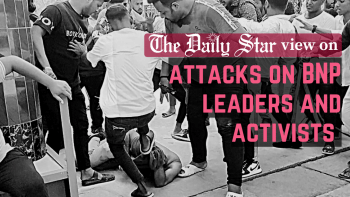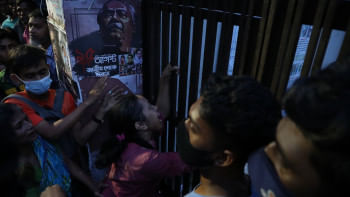The politicisation of police

It would be foolish to think that it was the first time that a police officer had been insolent towards an elected representative. But it was because the heated argument between Barguna lawmaker Dhirendra Debnath, who is also the president of Awami League's Barguna unit, and Barguna's Additional Police Superintendent Moharam Ali went viral on social media that people are taking notice of such an incident.
Police have been used regularly to muzzle the opposition in Bangladesh – and beyond – since time immemorial. But this happens to be a rare instance when the police appear to have turned on someone from the ruling party.
To discuss the impropriety of such behaviour from an employee of public service towards an elected representative is an exercise in futility. We will try to understand the possible reasons behind the police officer's audacity, and whether it was the reflection of a systemic shift in the mindset of the bureaucracy or just one police officer being insolent towards a ruling party leader. The bureaucracy knows that the ruling political camp does not have the currency or moral support to rightfully govern this country and must depend on them.
Over the years, the ruling party's dependency on not just the police, but also the entire bureaucracy, to govern in general, corner the opposition, and suppress dissent has basically emboldened law enforcers. The ruling political class has come to increasingly rely on our law enforcers, rather than on their own strength that stems from public support and political currency.
But this dependency on law enforcers to reign over the opposition and rule politically backfires almost invariably.
With the last two general elections being questioned, people's distrust of the politicians has only increased. The politicians have also become alienated from voters, because there are now easier ways to win elections – using the administration and law enforcement agencies. Law enforcers know how the lawmakers have been elected, and how strong they are. But the ruling government, perhaps in order to ensure the subservience and obedience of the law enforcement agencies and bureaucracy, has been on a spree to politicise them, sometimes enthusiastically recruiting party cadres and sympathisers.
Thus, the audacity the police personnel was showing was nothing but the result of the politicisation of police.

We have to acknowledge the fact that political use of police is an issue of serious concern, and we have been avoiding this real problem for a long time for personal or partisan benefits. Due to the unethical continuation of this malpractice, a nexus of politicians, police, and criminals has been created – and this is known to almost all.
This creates a double-edged problem: Weakened organisational structure of political parties, and deterioration of the police's public image. The former police chief AKM Shahidul Haque recently said that political parties and the bureaucracy in Bangladesh never wanted a change in the police. He said the parties in power wanted the police to do whatever the ruling people wished, and suggested that there should be a system so that the police can work in a non-partisan way.
The most important point he made in his statement was that the police is a part of the judiciary, and if they cannot act neutrally, the criminal justice system will never work: "A proper investigation is not possible if the police cannot act impartially. Legal reform is imperative if police are to act independently."
But for the politicisation of police, the ruling party should not be blamed alone. We have seen over the years how various governments assumed power and used the police for their own interests. The situation has reached a point where it has become difficult to find a government that used the police primarily in the interest of public service, instead of to serve the interests of the ruling government and the ruling party. We have a number of examples where the police were used to serve the interests of individuals.
So, in some cases, it has become tough to distinguish between the roles of political leaders and police officers. But in an ideal situation, political leaders were supposed to lay down the policy guidelines, and the police were supposed to execute the decisions within the framework of law.
Politicisation of police is detrimental to democracy and damages the basic structure of governance. So, the audacity that a police official has shown towards a sitting lawmaker is nothing but the result of their alienation from the people and the politicisation of police.
Politicians must rely on their own strength to govern the country. If they fail to do so, and rely on the law enforcers or the administration, then no one but the politicians will pay the most, and consequently, the nation will, too.
Mohammad Al-Masum Molla is deputy chief reporter at The Daily Star.

 For all latest news, follow The Daily Star's Google News channel.
For all latest news, follow The Daily Star's Google News channel. 







Comments